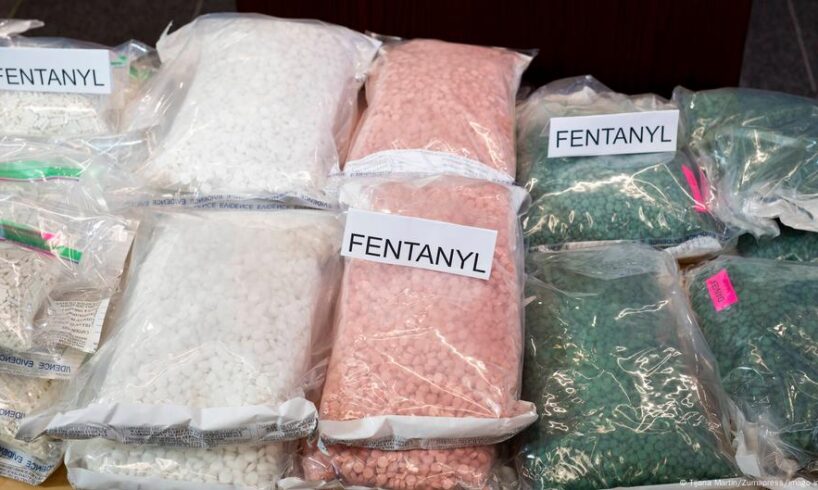
It could be pure coincidence, but the fact that the addiction care center in the western German city of Essen, population 600,000, is located on Hoffnungsstraße (“Hope Street” ) could also be a sign.
Hope for the people struggling with addiction, who find somewhere they can get a free meal and a place to sleep. Hope Street is also the place where they can snort, smoke or inject heroin in sterile drug consumption rooms, under supervision.
The scene is changing,” said Caspar Stolz from the harm reduction team in Essen. “Even people who have been consuming intravenous heroin for 15 years are now smoking crack,” he said. “The people deteriorate quicker because they can sometimes no longer escape the spiral of ’15-minute kick, get money, buy crack.'”
Sterile syringes are provided under medical supervision at the drug consumption room Image: Oliver Pieper/DW
Since the drug consumption room opened in 2001, there has not been a single death there, Stolz reports with satisfaction. But the latest, even more dangerous drugs are already on the doorstep.
In large German cities such as Frankfurt or Berlin synthetic opioids like fentanyl or nitazenes, which are mixed with heroin, have long been on the streets. Even a small amount, the size of a grain of salt, can kill.
Latest trend: Taking drugs live on TikTok
Essen addiction care spokesperson Ruben Planert has observed a worrying new trend which began during the COVID-19 pandemic: an increasing number of young people consuming anxiety-reducing benzodiazepine and opioids live on social platforms like TikTok, as the dealers wait in the comments.
Planert told DW: “Recently we had a young man in our youth facility who spent 5 days in a coma after smoking fentanyl. An overdose with respiratory paralysis, which with pure heroin is possible but very unlikely.”
What makes fentanyl even more dangerous: “The people consuming it often have no idea, because the heroin is laced with fentanyl; just enough that it does not lead to an overdose. Only experts and chemists can very precisely dose that, not any old street dealer.”
Essen, Hanover, Berlin: Model cities for prevention
Essen, along with Hanover and Berlin, is one of three model cities conscientiously preparing for a further increase in fentanyl. The project is called “Synthetic Opioids — Prepare and Response,” or “so–par” for short, and is set to serve as a blueprint for the whole country.
Emergency plans are being prepared, emergency services and hospital staff are being trained, and, above all, drug tests are being expanded to be able to detect opioids more precisely.
Ruben Planert (left) and Caspar Stolz say that the internet has made drugs significantly more accessible Image: Oliver Pieper/DW
Rebecca Lehmann from the addiction services department of the city of Essen told DW: “The goal of this 24-month project is for our municipality to get ahead of the situation […] Also to prevent our health system from being overwhelmed. It makes sense to develop an early warning system.”
Support from the federal government
The aim is to avoid cases like what happened two years ago in the English city of Birmingham, where 30 people died from overdosing on synthetic opioids. Or, also in 2023 in the Irish capital Dublin, when dozens of drug emergencies were caused by nitazenes.
The German government’s new commissioner for addiction and drug issues, Hendrik Streeck, has the issue of synthetic opioids on his radar and supports the “so-par” project.
“We must not repeat the failures of the past and react too late. That is why I advocate for a nationwide monitoring and early warning system that alerts police, emergency services, addiction care and drug consumers in real time whenever new dangerous substances appear,” he said in a statement to DW.
“It is also about sensitizing people to the dangers of drugs in general, boosting addiction treatment options and making sure that the emergency medication naloxone [used to reverse or reduce the effects of opioids] is available everywhere it is needed.”
Number of drug deaths drops, but no reason for complacency
Addiction researcher and health scientist Daniel Deimel had the idea for the project which aims to protect Germany from a further increase in use of synthetic opioids. The number of drug-related deaths in Germany reduced slightly in 2024 for the first time in a long time.
That is, however, no reason to give the all-clear, Deimel said. “We have an estimated 170,000 people in Germany who have an addiction to opioids. That is usually heroin; the number has been especially stable for many years,” he told DW.
About 10 years ago, the people in the open drug scene switched to processing cocaine from the black market into crack themselves. “They also consume heroin, as well as other drugs. We call this polyvalent consumption, meaning that several substances are being consumed.”
Fentanyl: America’s silent killer
To view this video please enable JavaScript, and consider upgrading to a web browser that supports HTML5 video
“There is no glory in prevention,” Deimel quotes virologist Christian Drosten, whose words were repeated throughout Germany at the beginning of the COVID-19 pandemic. It means that the best-case scenario is that the project helps prevent the worst-case scenario, without the public appreciating it later.
The addiction researcher advocates for better infrastructure and especially a whole-of-Germany strategy to combat the advance of fentanyl.
“When I speak with local politicians or officials, they are all already alarmed. But unfortunately, we have no comprehensive and nationwide drug checking, which would give us a better database. That is why municipalities are very well advised to think ahead, now we are still a little bit ahead of the wave,” he said.
This article has been translated from German.
While you’re here: Every Tuesday, DW editors round up what is happening in German politics and society. You can sign up here for the weekly email newsletter, Berlin Briefing.





